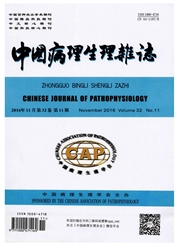

 中文摘要:
中文摘要:
目的定量分析Fuchs综合征患者白内障手术后炎症反应程度,为合理控制炎症提供客观依据。方法回顾性病例对照研究。对2008年7月至2009年12月在中山眼科中心就诊的11例Fuchs综合征并发白内障患者(11只眼)和11例(11只眼)对照组(年龄相关性白内障和先天性白内障患者)行超声乳化白内障吸除联合人工晶状体植入术,并用激光蛋白细胞检测仪观察手术前及手术后第1、7、30d和90d房水闪辉和房水细胞值。结果手术后第1天两组患者房水闪辉和房水细胞值显著增高,随后缓慢下降。Fuchs综合征患者组在手术前后不同时期,其房水闪辉和房水细胞值都高于对照组。但是两组患者房水闪辉和房水细胞值均于术后90d恢复术前水平。结论Fuchs综合征患者白内障手术后眼内炎症反应持续时间短,激光蛋白细胞检测仪可以精确定量评估眼内炎症反应程度,正确指导临床合理控制炎症。
 英文摘要:
英文摘要:
Objective To quantify the intraocular inflammation following phacoemulsification with posterior chamber lens implantation in eyes with Fuchs' heterochromic uveitis (FHU). Methods In this prospective study, 11 eyes of 11 patients with FHU (mean aged 31.6 years) and 11 eyes of 11 patients with age-related cataract or congenital cataract (mean aged 42.1 years) underwent phacoemulsification with posterior chamber lens implantation. Aqueous flare and cells were quantified using the laser flare-cell meter (LFCM) following medical pupillary dilation preoperatively and 1, 7, 30 and 90 days postoperatively. Results Highly statistically significant differences in flare value were demonstrated in patients with FHU vs. controls at 1, 7, and 30 days after surgery. On 1 day and 7 days post-surgery, cell counts were significantly increased in the FHU group compared to the control group, while no statistical differences were apparent 30 or 90 days after surgery. Conclusions Our data indicate that postoperative intraocular inflammation is relatively mild in eyes with FHU and measurement of aqueous flare and cell count by laser flare-cell photometer is an objective method to determine intraocular inflammation following cataract surgery in eyes with FHU.
 同期刊论文项目
同期刊论文项目
 同项目期刊论文
同项目期刊论文
 Molecular analysis of the choroideremia gene related clinical findings in two families with choroide
Molecular analysis of the choroideremia gene related clinical findings in two families with choroide Prognostic Factors and Visual Outcome for Fireworks-Related Burns During Spring Festival in South Ch
Prognostic Factors and Visual Outcome for Fireworks-Related Burns During Spring Festival in South Ch 期刊信息
期刊信息
